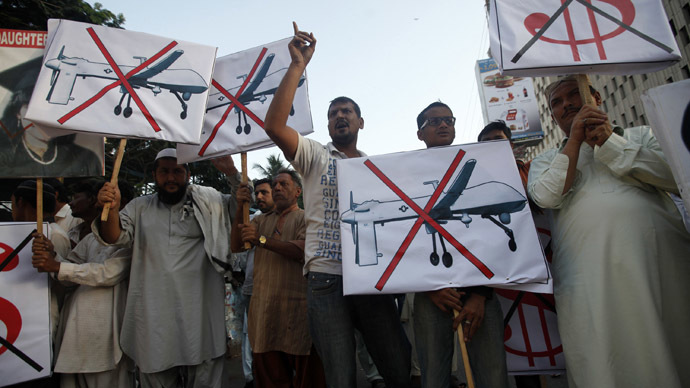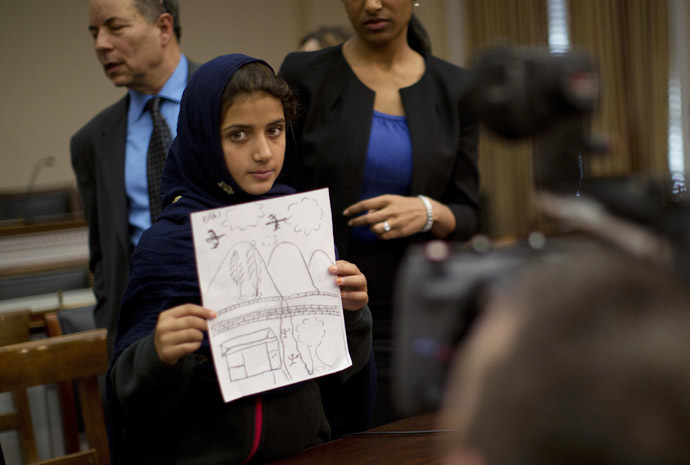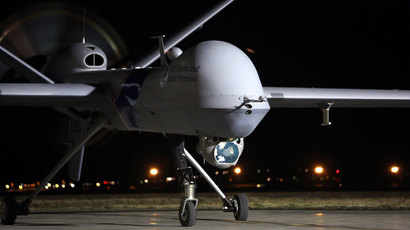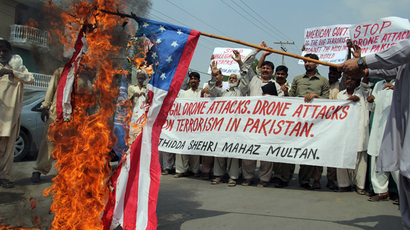Pakistan says only 3% of drone strike victims were civilians

Pakistan’s government has come up with new data on US drone strikes: only 3 percent killed since 2008 are civilians. The figure is dramatically lower than the numbers provided not only by independent organizations, but also by past Pakistani governments.
According to the Defense Ministry’s data, 317 drone strikes have killed 2,160 Islamist militants and 67 civilians over the last five years. The latest report also stated that not a single civilian died in the 59 strikes conducted in 2012 and 2013, but 319 militants were killed.
Those figures are significantly lower than past independent, and,
more surprisingly, government estimates.
The London-based Bureau of Investigative Journalism estimated
that drones have killed at least 500 civilians, or around 20
percent, in Pakistan over the past decade. The two-year-old
project launched by the bureau is called ‘Naming the Dead’ and is aimed at tracking
drone victims and “to increase the transparency around this
conflict and inform the public debate.”
The New America Foundation in Washington DC put the death toll at 185 civilians over the last five years.
Amnesty International released a report at the beginning of
October, slamming US drone use, saying it may qualify as war crimes. The organization also disclosed
new details on the US drone strikes, including the death of a
67-year-old woman killed by missile fire in October 2012 while
farming with her grandchildren in North Waziristan.
The members of her family arrived in the US to testify before the Congress on Tuesday.
"As I helped my grandma in the field, I could see and hear drone overhead but wasn’t worried because we’re not militants,” Zubair, the woman’s 12-year-old grandson, said. "I no longer like blue skies. In fact, I prefer gray skies. When sky brightens, drones return and we live in fear.”

Earlier this month, Ben Emmerson, a UN expert investigating drone strikes, told the Washington Post that the Pakistani Foreign Ministry had informed him of 400 civilians, around 18 percent of the dead, in the death toll since 2004.
Last week, the Pakistani Prime Minister, Nawaz Sharif, on a visit to the White House urged President Obama to stop the strikes, but the president demonstrated no desire to comply with the demands.
Meanwhile, the Pakistani government regularly criticizes the drone program in public, even though reports emerged that it might have secretly supported at least some of the strikes.
Just a week ago, the US approved $1.6 billion in aid to Pakistan, a signal that the tense relations over US military involvement in the country have warmed.
For its part, the US administration hasn’t revealed the official death toll of civilian casualties for national security reasons. It claims the count is significantly lower than the numbers floating around in public (ranging anywhere between dozens to hundreds of deaths).
Patrick Henningsen, a writer, investigative journalist, and filmmaker and founder of the news website 21stCentury Wire.com, wrote in his blog for RT that AI [Artificial Intelligence] will soon exonerate the politicians of any responsibility for the killings.
“Just as war-shy politicians in Washington embraced the use of
drones because it distanced them from having to answer for dead
US troops coming home in body bags, the prospect of a new wave of
AI drones will most certainly be welcome by today’s political
invertebrates. Why? Because it gives politicians what they have
been craving for generations: the ultimate legal out - the
ability to devolve responsibility for killing other humans to a
machine. If this sounds like outrageous dystopic science fiction
for some, just consider how the progression of this technology
has already moved forward in political circles on its ‘ethical’
merits,” Henningsen said.














